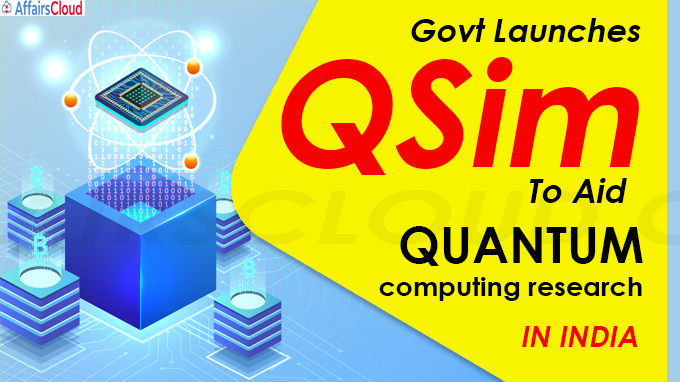 On August 27, 2021, Minister of State (MoS) Rajeev Chandrasekhar, Ministry of Electronics & Information Technology (MeitY) launched ‘QSim – Quantum Computer Simulator Toolkit’ during a hybrid event from New Delhi to aid and enable cost effective research in Quantum Computing. It will be utilized by students and researchers.
On August 27, 2021, Minister of State (MoS) Rajeev Chandrasekhar, Ministry of Electronics & Information Technology (MeitY) launched ‘QSim – Quantum Computer Simulator Toolkit’ during a hybrid event from New Delhi to aid and enable cost effective research in Quantum Computing. It will be utilized by students and researchers.
- It is a product of project ‘Design and Development of Quantum Computer Toolkit (Simulator, Workbench) and Capacity Building’ which is executed collaboratively by IISc (Indian Institute of Science) Bengaluru (Karnataka), IIT (Indian Institute of Technology) Roorkee (Uttarakhand) and C-DAC (Centre for Development of Advanced Computing) with the support of MeitY.
- This project is among the first initiatives to address the challenge of advancing the Quantum Computing research frontiers in India.
Models of QSim:
It is available in 2 models:
i.PARAM SHAVAK QSim: Standalone system with Quantum Simulator in a box
ii.PARAM QSim Cloud: Available on cloud using HPC (High-performance computing) infrastructure PARAM SIDDHI AI (developed and deployed under NSM program)
About QSim:
i.Quantum Simulators are devices that allow scientists to study quantum effects, which are otherwise difficult to study in a lab.
- It allows researchers and students to write and debug Quantum Code which are important for developing Quantum Algorithms.
- It will serve as an important educational and research tool to acquire programming and designing skills of real Quantum Hardware.
ii.As Quantum systems are highly sensitive to disturbances from the environment, QSim allows exploration of Quantum Algorithms under idealized conditions.
- It helps simulate Quantum circuits with and without noise to test various algorithms that work with imperfect quantum components.
iii.Other Features: Intuitive UI (User Interface); Pre-loaded Quantum algorithms and Examples, Integrated with HPC; Simulate noisy Quantum logic circuits.
What is Quantum Computing?
It is the study of how to use phenomena in quantum physics to create new ways of computing. In a normal computer there is a bit, which can be 0 or 1. On the other hand, in quantum computing there are qubits which can be either of those, or a superposition of both 0 and 1, thereby enhancing the ability of computers.
Other Efforts by Indian Government to enhance Quantum Computing Research:
i.Finance Minister Nirmala Sitharaman proposed an outlay of Rs 8000 crore over a period of five years in 2020 Union Budget for the National Mission on Quantum Technologies and Applications.
ii.MeitY had also announced a collaboration with Amazon Web Services (AWS) earlier, to develop a Quantum Computing Applications Lab in India.
Other Participants:
MeitY Secretary Ajay Prakash Sawhney, and senior officers from Meity.
- Virtual Participants: Krishnaswamy Vijay Raghavan, Principal Scientific Advisor to Government of India, Prof. Govindan Rangarajan, Director, IISc Bangalore, Prof. Ajit Kumar Chaturvedi, Director, IIT Roorkee, Ms. Debjani Ghosh, President, NASSCOM (National Association of Software and Service Companies), among others.
Recent Related News:
MeitY signed a Memorandum of Understanding (MoU) with MapmyIndia, thereby enabling map services in ‘UMANG App’. UMANG stands for Unified Mobile Application for New-Age Governance.
About Ministry of Electronics & Information Technology (MeitY)
Union Minister– Ashwini Vaishnaw (Constituency– Odisha)
Minister of State (MoS) – Rajeev Chandrasekhar (Constituency- Karnataka)




